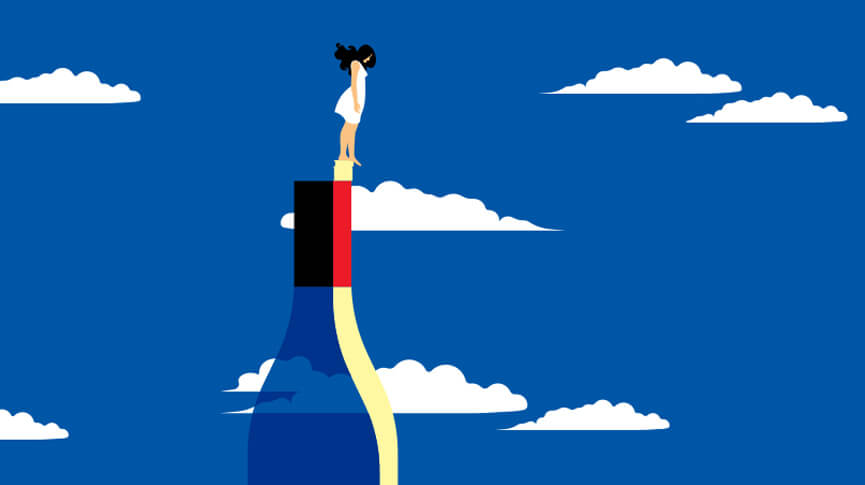Benefits of quitting alcohol: How Will Your Body Respond to New Rules?

Alcoholic drinks have been normalised for centuries. Having a glass of wine during dinner, cocktails with friends on a night out, or champagne as a means to celebrate is ingrained in so many societies, that many don’t even blink an eye when it comes to how it affects the body.
Of course, everything is in moderation. But when drinking alcohol becomes slightly more than moderate in quantity, there are some negative side effects to consider—on your physical and mental health.
5 Positive Reasons Your Body will Thank You for Quitting Alcohol
Instead of solely focusing on the negative effects of alcohol, we’re going to flip it on its side to reflect some of the positive effects you can experience when you cut down or stop drinking alcohol.
In other words, we’re going to talk about how your body responds to less alcohol or quitting drinking completely, and the health risks associated with alcohol misuse.
After all, when you drink alcohol (in excess), it really is just consuming empty calories and can lead to alcohol abuse and alcoholism, high blood pressure, fatty liver, and other health risks.
1. Better Heart Health
When one drinks alcohol in moderation, it gets metabolised by the liver and the enzyme, dehydrogenases. However, when one engages in heavy drinking, dehydrogenases get saturated and metabolised by a different enzyme which oxidises bad cholesterol (LDL). The LDL is then deposited on the carotid arteries (major blood arteries in the neck that supply blood to the brain, neck and face) forming a blockage.
Having said that, drinking in moderation, say one or two glasses of wine once or twice a week, can actually increase one’s level of good cholesterol (HDL).
2. Reparation of the Liver
Did you know that the liver has the ability to repair itself? Excessive alcohol consumption (at least 15 drinks for penis owners and eight or more for vulva owners) can have extremely negative side effects on the liver, causing conditions such as fatty liver and cirrhosis.
On the plus side, the liver has a unique ability to actually ‘fix’ itself slowly and even regenerate after damage. This is great news for those who are heavy drinkers, as quitting alcoholic beverages could lead to much better liver health and overall physical wellbeing.
3. Improved Sex Life
There are a number of sexual dysfunctions that can occur due to binge drinking. Erectile dysfunction in penis owners, for example, and the inability for vulva owners to gain arousal, produce natural lubrication and/or reach climax is highly possible once a few drinks have been consumed. This is because alcohol slows down the messengers in the brain, reducing blood flow to the genitals.
The good news is, once you cut down or quit alcohol use, you should be able to naturally gain your levels of libido once again and enjoy a healthier sex life (unless there are other underlying issues creating your sexual health problems, in which case we suggest seeking professional medical advice).
4. Better & Higher Quality Sleep
After a few too many drinks, it’s likely that drowsiness may occur. With that, one may fall asleep easier or quicker, leading them to believe that alcohol is a magical sleeping aid. Sadly, the opposite is true.
Drinking in excess can lead to disruption of the Rapid Eye Movement (REM) stage of sleep. This stage is important because it stimulates the areas of the brain that are essential for learning, making and retaining memories.
Quitting alcohol, or eliminating alcohol from your everyday routine, can have amazing results on your quality of sleep, however.
You’ll not only get more hours of decent sleep but you’ll also experience a boost in better decision making, creativity, eating patterns, and problem-solving. In other words, you’ll enjoy a number of mental health benefits and feel physically healthy too.
5. Better Immune System Functioning
By default, alcohol makes it harder for the immune system to get ready to defend the body against harmful germs. And according to Dr. E. Jennifer Edelman, a Yale Medicine addiction medicine specialist, “Alcohol has diverse effects throughout the body, including on all cells of the immune system, that lead to increased risk of serious infections”.
Heavy drinkers will also have a hard time fighting off diseases, as alcohol consumption actually distracts one’s body from its other functions.
In other words, when alcohol abuse and alcoholism is involved, it can worsen any kind of infection which could lead to severe life-threatening complications.
Adversely, when one changes their drinking habits for the better, the body then has the ability to fight off infections and focus on what it’s meant to do—keep you healthy and safe.
3 Reasons Why Quitting Alcohol Benefits Women
While the above four benefits of reducing or quitting alcohol are applicable to both penis owners and vulva owners, there are a few benefits that only the latter can experience.
On the not-so-good side, vulva owners “develop consequences to alcohol faster than penis owners, thanks to several biological factors,” said Dr James Garbutt, MD, a professor of psychiatry at UNC’s Bowles Centre for Alcohol Studies.
One of these factors include the fact that vulva owners tend to have less water in their bodies, and alcohol is dispersed in the water available in a person’s body. Essentially, this leaves their organs and brain exposed to more alcohol and more harmful toxins when the body begins to break down the alcohol.
To lighten the mood, however, if a vulva owner decides to quit drinking and live a sober life, they can experience these three unique benefits.
1. Lower Chance of Breast Cancer
Sadly, there is an increased risk of breast cancer in vulva owners when alcohol is involved. In actuality, a study found that vulva owners who drink moderately have a 30 to 50 percent higher chance of getting breast cancer as opposed to vulva owners who don’t drink.
Luckily, this 30 to 50 percent risk will no longer be present should a vulva owner quit drinking. In fact, the World Health Organisation in Europe (WHO) said that vulva owners who simply reduce their alcohol consumption can greatly reduce their risk of getting breast cancer.
2. Regular, Lighter & Less Painful Menstrual Cycles
There is a high chance of disruption or complete halt to one’s period when alcohol consumption is high. This is because alcohol increases a vulva owner’s levels of oestrogen and testosterone, creating an imbalance of hormones that can directly influence one’s period, how long it lasts, and how heavy it is.
On the plus side, eliminating alcohol from one’s life and stopping drinking can result in a menstrual cycle that follows a healthy and regular schedule.
Not just that, but they’ll experience fewer menstrual symptoms, such as moodiness, trouble sleeping, bloating, and cramps. In fact, the alleviation in period cramps is significant without alcohol as drinking causes a higher level of prostaglandins. Prostaglandins is a group of lipids that trigger contractions of the uterine muscle (contractions that cause more intense menstrual cramps).
Additionally, heavy alcohol consumption is associated with heavier bleeding during menstruation. Why? Because alcohol is a blood thinner and encourages an increase in the hormone, oestrogen. Oestrogen stimulates the growth of endometrial tissue (the lining of the uterus that’s shed during menstruation).
In short, less alcohol, or even stopping drinking completely, can result in regular, less debilitating, and less heavy periods.
3. Lower Possibility of Female Sexual Dysfunction
And last but definitely not least, drinking more alcohol can increase a vulva owner’s possibility of experiencing female sexual dysfunction (FSD). In a study, it was found that 57 percent of just over 1,500 sexually active vulva owners were classified as having FSD. Of this number, 80 percent reported alcohol use and 48 percent reported possible hazardous drinking patterns. And to experience sexual health doesn’t just affect one’s physical health, it too can disrupt the functioning of one’s mental health
And just as we mentioned earlier, alcohol can have a negative effect on one’s sexual health in general, and this study simply solidifies that fact.
Fear not though, as reducing your alcohol intake or quitting drinking can have all sorts of positive effects on your sex life, allowing you to enjoy pleasure… just as you deserve.ž
Want to Live a Sober Life?
While we cannot offer you professional medical advice, we are all for our readers living their best lives, and being happy and healthy. There are several treatment facilities in various forms and substance abuse treatment options available for those who are thinking of quitting alcohol.
No one should be a victim of alcohol dependence, and it’s clear that lower or zero consumption of alcohol is linked to all kinds of physical, mental, emotional, and sexual wellbeing! Go on and live your best life with moderate or zero drinking!

Helena is a sex-positive South African writer who loves swimming in the ocean under the full moon and cheesy 90’s pop. She’s currently living her best life in Porto, Portugal after scouring different continents to find her happy place.


